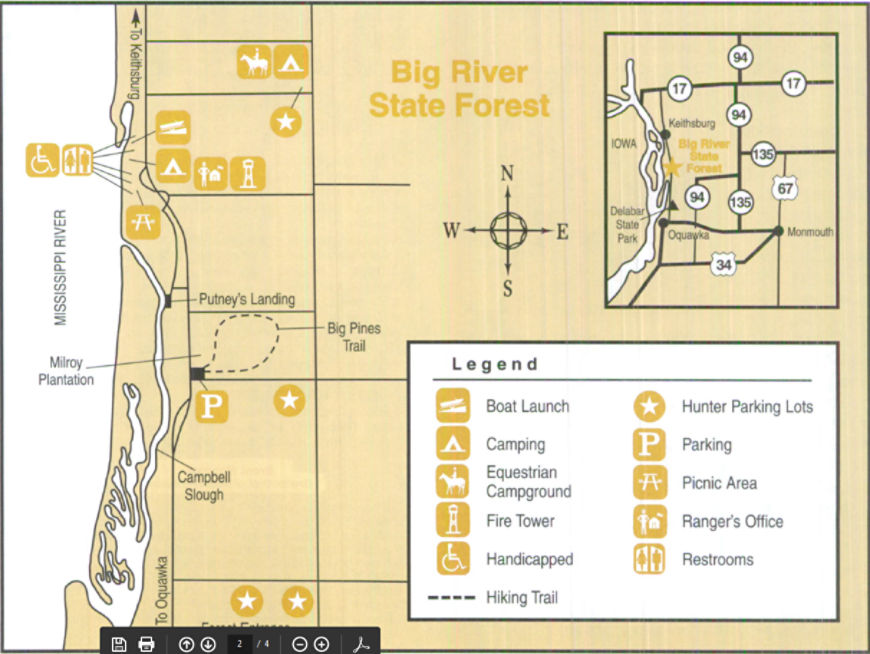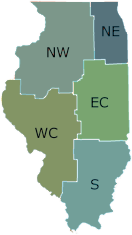Park Activities
- Big River State Forest
Park Brochure
- While groups of 25 or more are welcome and encouraged to use the park's facilities, they are required to register in advance with the site office to avoid crowding or scheduling conflicts. * At least one responsible adult must accompany each group of 15 minors.
- Pets must be kept on leashes at all times.
- Actions by nature can result in closed roads and other facilities. Please call ahead to the park office before you make your trip. We hope you enjoy your stay. Remember, take only memories, leave only footprints.
Area
Big River State Forest in western Illinois’ Henderson County is 8 miles north of Oquawka on the Oquawka-Keithsburg blacktop. The forest is managed primarily to demonstrate sound forestry practices, with demonstrations and talks on these practices available to interested groups.
History
The 200-acre Oquawka Refuge, acquired by the state in 1925, contains the area’s oldest pine plantation. Established in 1928 and known as the Milroy Plantation, the 17-acre area contains red, white and jack pines that tower more than 50 feet high. Subsequent land purchases, beginning in 1941 and 1942, and a lease from the U.S. Army Corps of Engineers, have brought the forest to 2,900 acres.
Natural Features
Big River State Forest is a remnant of a vast prairie woodland border area that once covered much of Illinois. Among its vegetation are two endangered plants - penstemon, commonly known as bearded tongue, and Patterson’s bindweed, which N.H. Patterson documented in 1873, for the first time anywhere, in the forest.
Common plants found in the prairie are big and little bluestem, Indian grass, June grass, grama grass, flower-of-an-hour, cottonweed, prairie coneflower, pale prairie coneflower, prairie bush clover, purple prairie clover and blazing star. Also found are western sunflower, kittentail, lead plant, prickly pear cactus, flowering spurge, aromatic sumac, false dragonhead, Sullivan’s milkweed, horsemint, goat’s-rue and hoary puccoon.
Timber Stand Conversion
To demonstrate the feasibility of growing profitable pine forests on the type of sandy soil found in the area, much of the forest has been converted from scrub hardwood to pine. This "timber stand conversion" consists of removing scrub hardwood, salvaging the saleable material for pulpwood, controlling hardwood reproduction and planting rapidly growing white and red pines. Many area landowners have adopted these conversion practices and established hundreds of thriving pine plantations throughout the area.
Forest Fires
A prominent landmark in the forest is its fire tower, located at the headquarters area. Fire fighting crews and equipment also stand ready to protect the forest during peak fire periods.
To separate the forest into manageable components, 60 miles of firebreaks interlace Big River State Forest. When fires aren’t a threat, hikers and horseback riders appreciate the diverse scenery the firebreak trails provide.
Directions
For visitors coming from the south, east and west, BIG RIVER can be reached from Highway 164. The forest is well signed on Highway 164. Go north on the Oquawka-Keithsburg blacktop road for 9 miles. The office is located on the right.
For visitors coming from the north, take Highway 17 to Keithsburg. The forest is well signed on Highway 17. Turn left at Main Street and go to the next 4-way stop. Turn right (going south) and go 4 miles on the Oquawka-Keithsburg blacktop. The office is located on the left side of the road.
For visitors coming from the south, west, and east, DELABAR PARK can be reached from Highway 164. The park is well signed on Highway 164. Go north 2 miles on the Oquawka-Keithsburg blacktop road. The park entrance is located on the left.
If coming from the north, take Highway 17 south to Keithsburg. Turn left at Main Street going east to the first 4-way stop. Turn right (going south) and go 10 miles. The park entrance is located on the right.
For visitors coming from the south, east, and the west, HENDERSON COUNTY CONSERVATION AREA can be reached from Highway 34. The site is well signed on Highway 34. Turn 1 mile west of junction 164 and 34(north) on a gravel road and go 1 mile. The entrance is on the left side.
For visitors coming from the north, take Highway 164 south to Gladstone. Continue south on 164 to junction 164 and 34. Turn right and go west 1 mile. Then turn right (north) on gravel road and go 1 mile and the park entrance is on the left.
Additional Information
Northwestern Illinois
1337 Township Road 2850N
Keithsburg
61443-9609
41.049
-90.930



